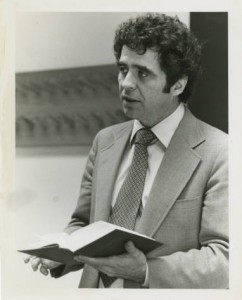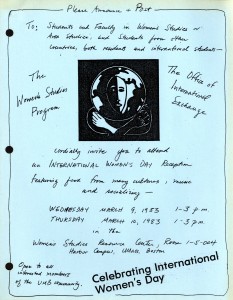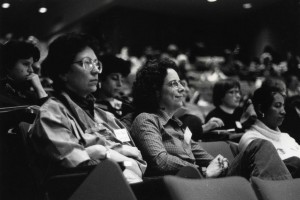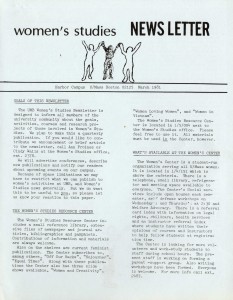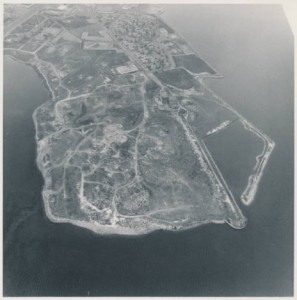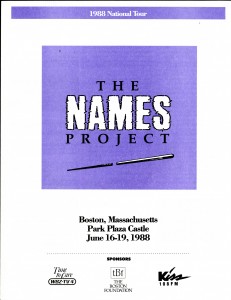
Click on the cover of the program book to read about events and planning related to the quilt display in June 1988.
On Tuesday, December 1, UMass Boston will host a World AIDS Day Community Reception featuring a display of sections from the AIDS Memorial Quilt. The display runs from November 30 through December 4 and will be open daily in the Campus Center at UMass Boston from 7:00 am to 11:00 pm.
This will mark the third time that sections from the quilt have been on display at UMass Boston, according to records, photographs, and publications in University Archives & Special Collections in the Joseph P. Healey Library.
The NAMES Project: AIDS Memorial Quilt is a memorial to those who have died of AIDS (Acquired Immune Deficiency Syndrome). According to a press release from the Office of Diversity and Inclusion at UMass Boston, the department on campus responsible for arranging for the display: “The AIDS Memorial Quilt began with a single 3 x 6 foot panel created in San Francisco in 1987. Today, The Quilt is composed of more than 48,000 individual 3 x 6 foot panels, each one commemorating the life of someone who has died of AIDS. These panels come from every state in the nation, every corner of the globe and they have been sewn by hundreds of thousands of friends, lovers and family members into this epic memorial, the largest piece of ongoing community art in the world.” Learn more about the AIDS Memorial Quilt here.
The first display of the AIDS Memorial Quilt at UMass Boston was in the Armory building in Park Square (which some refer to as “The Castle”) in June 1988.
This 1988 display at the site of UMass Boston’s original Park Square campus was organized by the New England Chapter of the NAMES Project. Founded in late 1987, the New England Chapter changed its name to the Boston Chapter in 1989. University Archives & Special Collections in the Healey Library holds the records of the Boston Chapter of the NAMES Project. View the finding guide for this collection here.
In 1998, UMass Boston arranged for another display of the quilt in the Clark Athletic Center at UMass Boston. During the opening ceremony on April 23, volunteers unfolded the quilt and began reading aloud names of some of those lost to AIDS, according to an article in the May 18, 1998, edition of the University Reporter. Photographs from the 1998 display were digitized by University Archives & Special Collections as part of our Save Our History! campaign and are available here.
The AIDS Memorial Quilt display runs from November 30 through December 4 and will be open daily in the Campus Center at UMass Boston from 7:00 am to 11:00 pm.
The quilt display is sponsored by the Office of Diversity and Inclusion; Campus Center; College of Nursing and Health Sciences; Student Arts and Events Council (SAEC); University Health Services; Anthropology Department; Bay State Stonewall Democrats; Division of Athletics, Recreation, Special Projects and Programs; and Boston Pride.
University Archives & Special Collections in the Joseph P. Healey Library at UMass Boston collects materials related to the university’s history, as well as materials that reflect the institution’s urban mission and strong support of community service, notably in collections of records of urban planning, social welfare, social action, alternative movements, community organizations, and local history related to neighboring communities.
University Archives & Special Collections welcomes inquiries from individuals, organizations, and businesses interested in donating materials of an archival nature that that fit within our collecting policy. These include manuscripts, documents, organizational archives, collections of photographs, unique publications, and audio and video media. For more information about donating to University Archives & Special Collections, click here or email library.archives@umb.edu.









